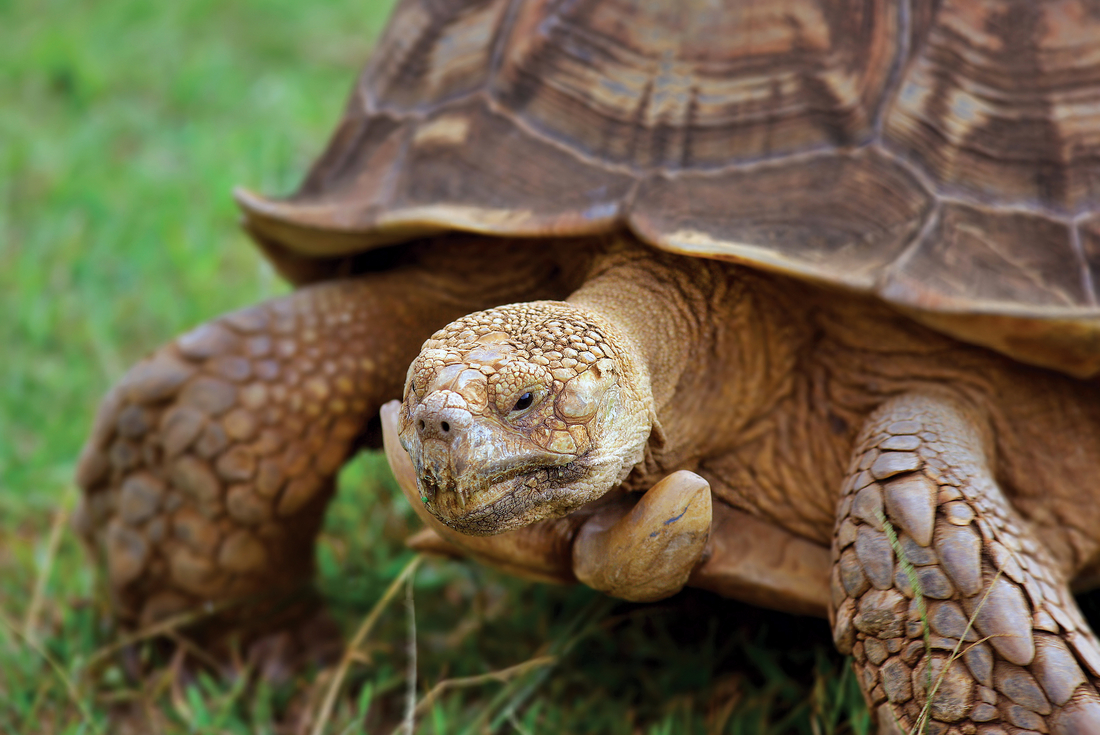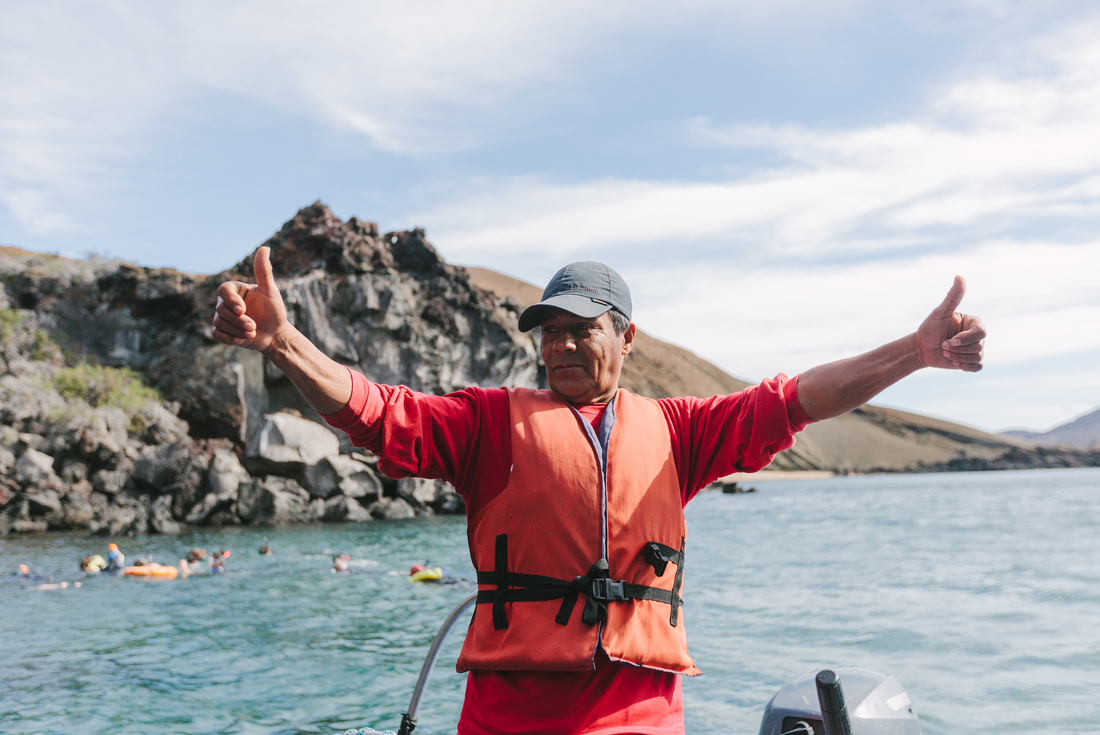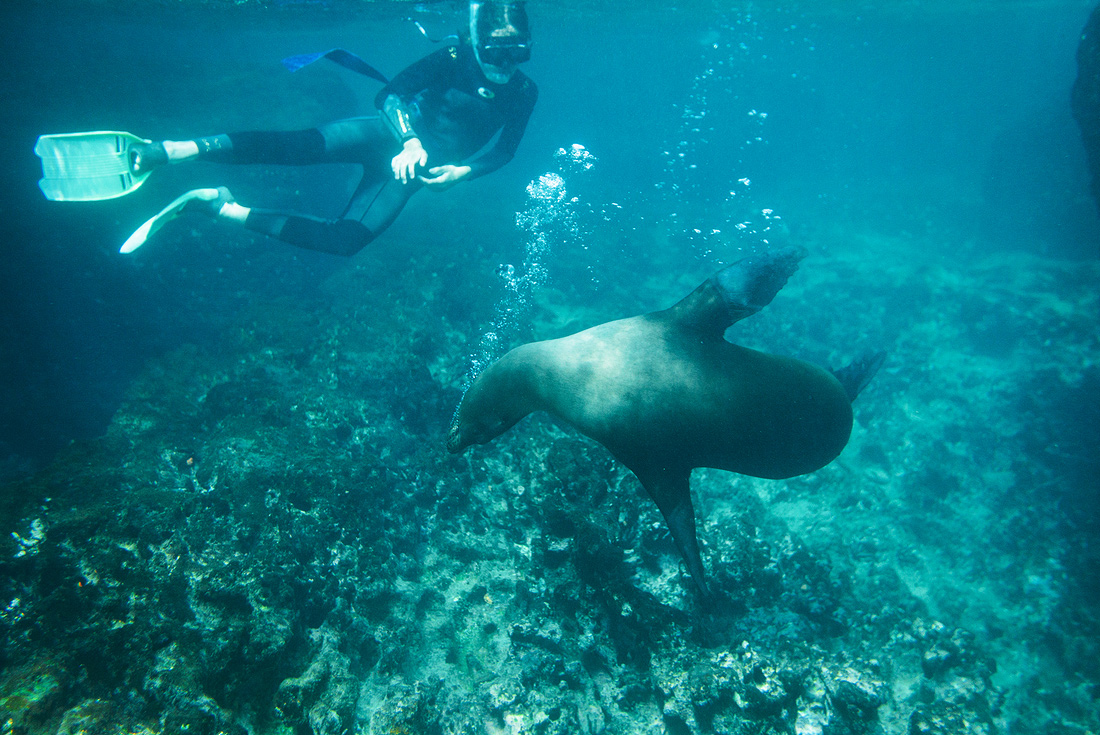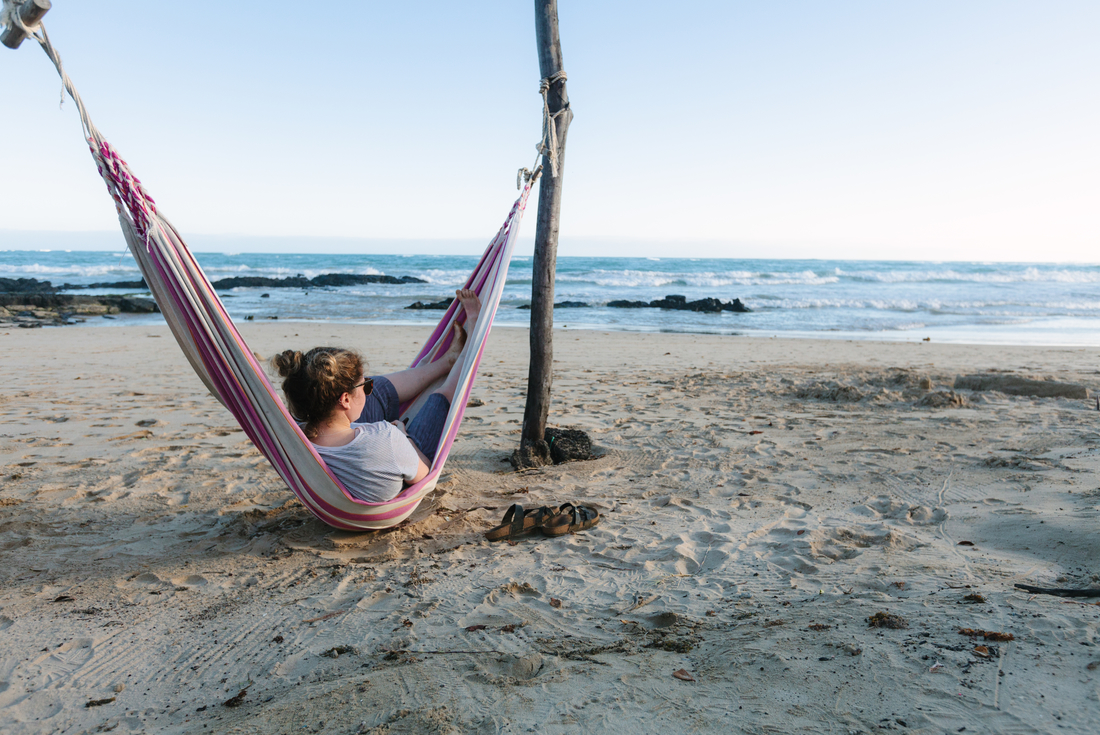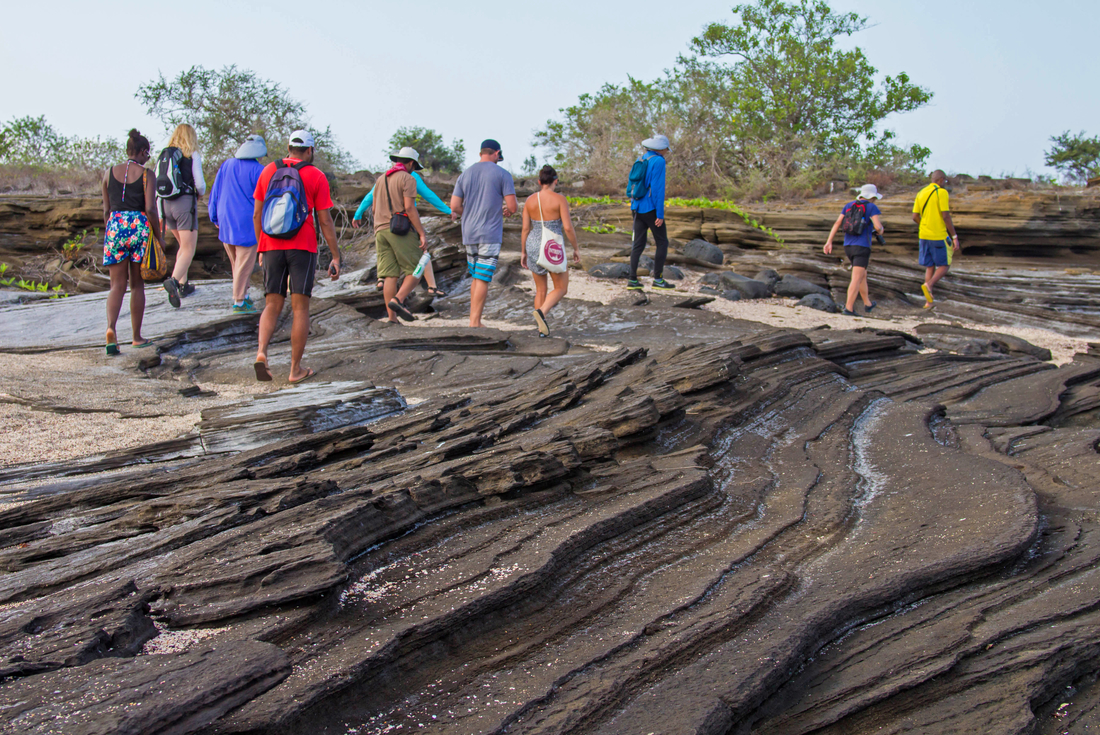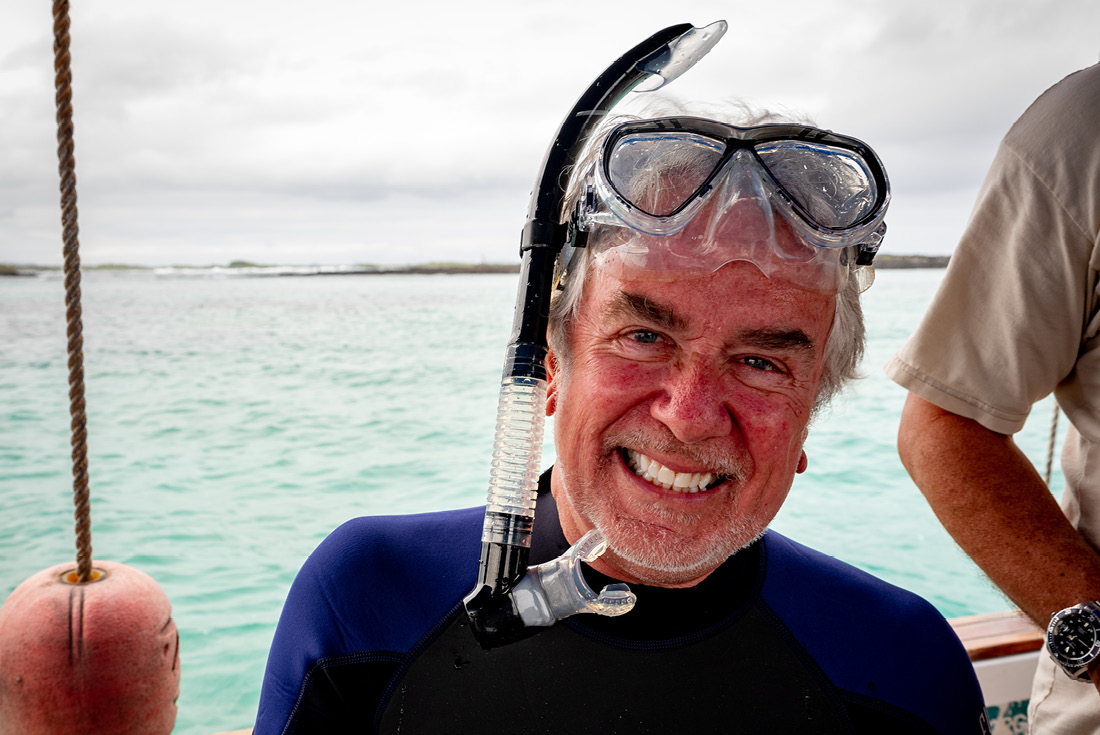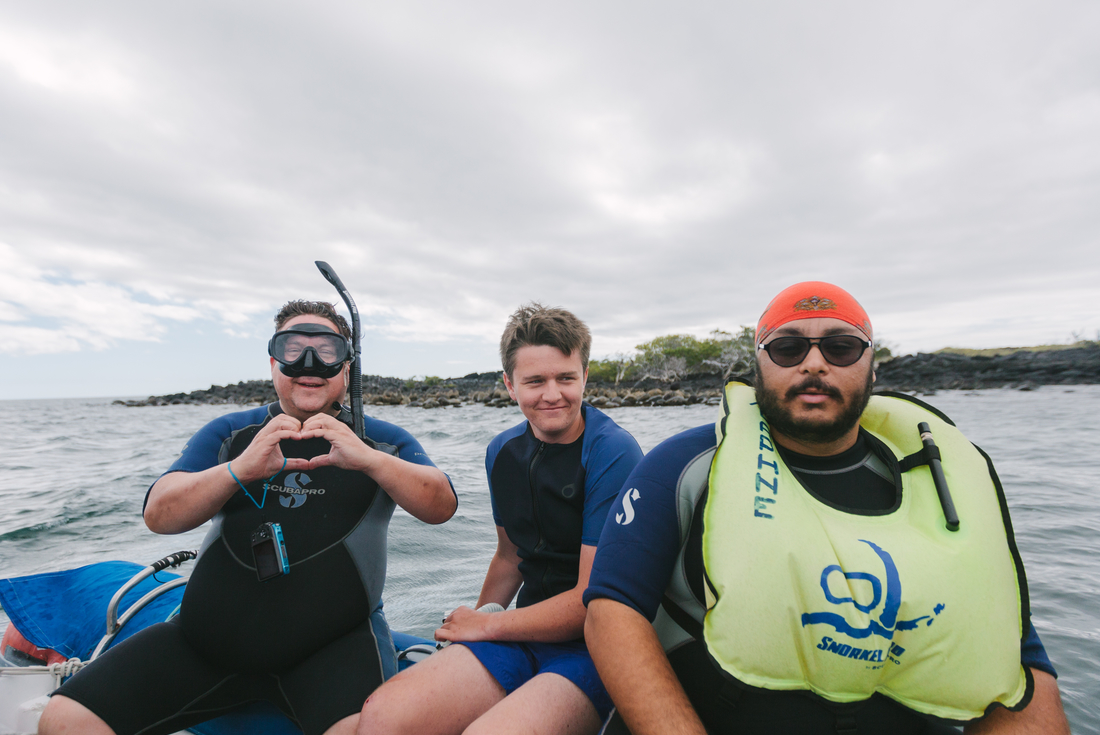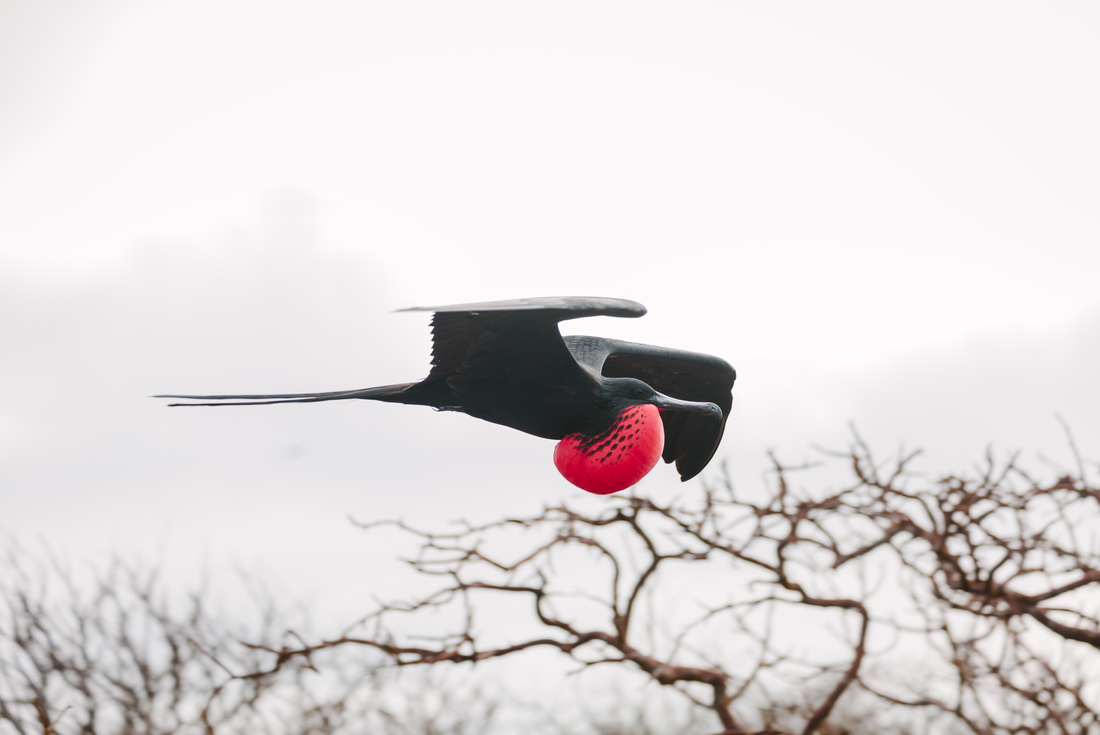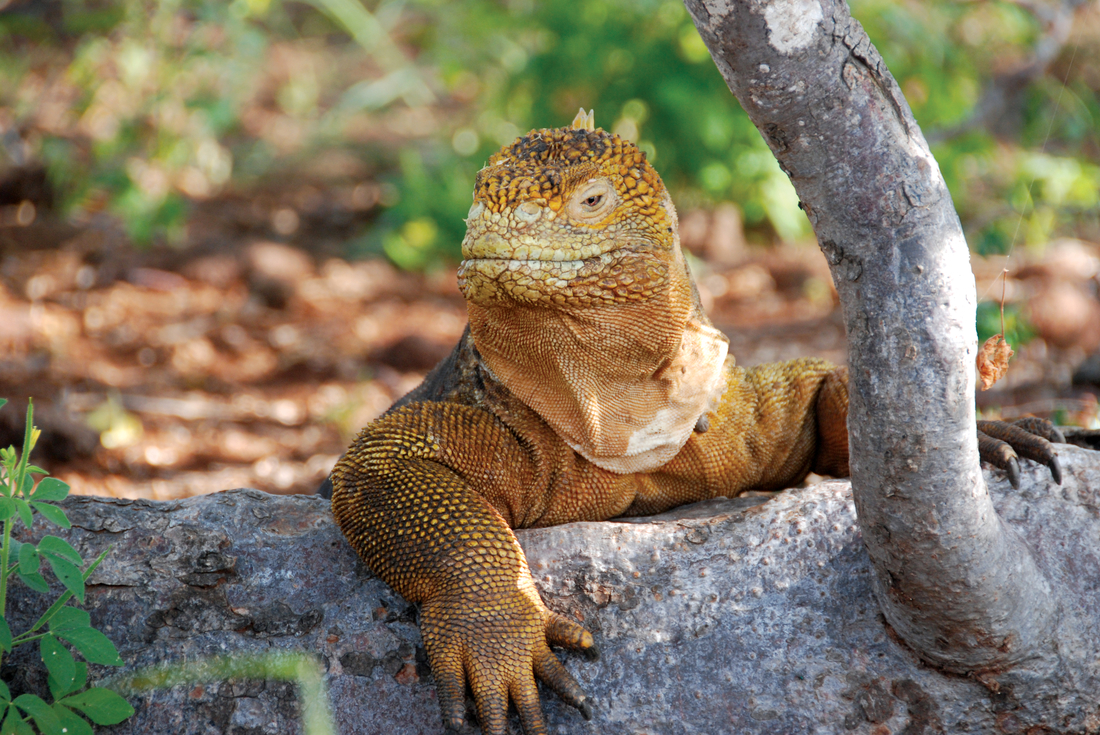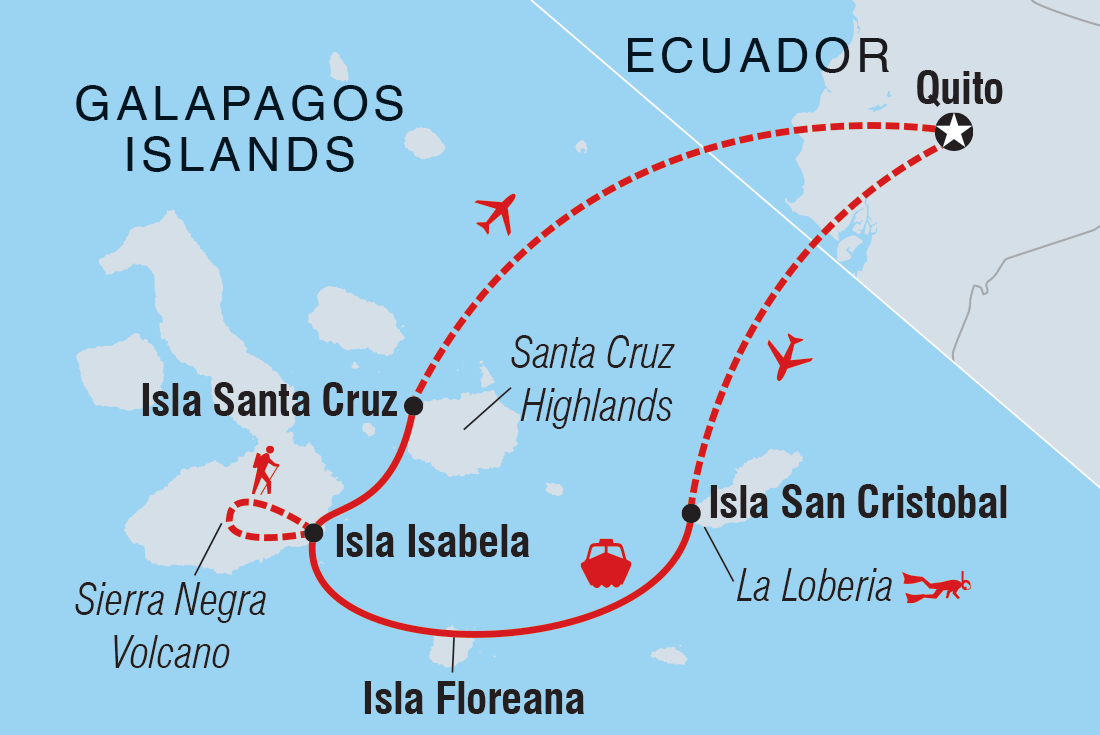Account Number : 63245268
Sort Code : 204281
Best of Galapagos
Best of Galapagos
Amazing wildlife, both on land and underwater, is the main drawcard of the remote Galapagos Islands. On this ten-day trip through the best of the Galapagos, you’ll uncover the outstanding natural beauty of these islands both on foot and by boat, looking for giant tortoises, sharks, blue-footed boobies, pelicans, seals, iguanas, dolphins, whales and birdlife along the way. Trace Darwin's theory of evolution, go snorkelling across multiple islands, hike up a volcano for the best views and soak up the experience with a group of likeminded travellers and a local leader who knows all the best spots.
Tour At a Glance
- Encounter the nearly extinct giant Galapagos tortoises, as well as blue-footed boobies, pelicans and frigate birds, land and marine iguanas, sea lions, fur seals and maybe even dolphins and whales!
- Go snorkelling on multiple days throughout different islands, looking out for sea turtles and the harmless Galapagos shark.
- Get your blood pumping as you scale the Sierra Negra Volcano – one of the Galapagos’ most active volcanoes and the world's second-largest crater!
- Learn how to make the famed encebollado – a local fish soup considered one of the best in the world! Your expert chef will take you through a fun cooking class, then you’ll tuck into the hearty dish for lunch.
- Enjoy a land-based Galapagos trip, using locally owned hotels on the islands instead of staying on a boat, which means you’ll have more opportunities to interact with the locals.
- By travelling on this trip, you’ll directly support our Intrepid Foundation partner, The Galapagos Conservancy. Donations support their Women in Sustainable Entrepreneurship (WISE) program, providing capital for sustainability initiatives and empowering female entrepreneurs in the Galápagos.
- Tour code: GGTF
- Group Adventure
Dates & Prices
Is this trip right for you.
- This trip visits places that are at high altitude, and as a result some people can suffer from altitude sickness, regardless of age or physical health. Please see the Medical and health information section of the Essential Trip Information for more detail.
- This trip includes a 17 km hike (approximately 6 to 7 hours) on rocky terrain. We recommend bringing comfortable shoes with good support. Please see Day 6 of the Itinerary for more information.
- This trip involves a lot of travel by speedboat between the various Galapagos Islands. The rides can be quite bumpy at times, but the good news is that seasickness can often be managed with medication. Please consult a health professional to assess your suitability for such medication.
- From June to August the water in the Galapagos can be rougher than usual. Consequently, travel times will be longer than usual. If you suffer from seasickness you may want to reconsider travelling during this period.
- Proximity to the equator means the sun in the Galapagos is incredibly strong. Ensure you are prepared with sunscreen, a hat and sunglasses. We also recommend a rash guard.
- This trip includes snorkelling on multiple days. Confident swimming skills are required to take part. Alternative activities will not be available.
- Many travellers express interest in diving in the Galapagos. We are now able to assist with booking this activity, but only through a provider that meets our internal safety policy. Speak to your agent at the time of booking for more information.
- The Galapagos is a great place to switch off and take a break from your phone, as internet access can be patchy and wi-fi is not always available or reliable.
- Hot water can be sporadic in some parts of the Galapagos, so there may be a few cold showers on the trip.
- If you would like a trip that starts and ends in the Galapagos, please search the website for our trip Galapagos Island Hopping (GGTG).
Accommodation
- Hotel ( 9 nights)
Joining point description
Hotel La Cartuja is a charming property conveniently located 35kms from Mariscal Sucre International Airport and just a short walk from El Ejido Metro Station, Ecovia e-bus line, and Supermaxi market. Each guest room features a TV, an ensuite, and free WiFi.
Joining point instructions
Intrepid can assist with pre-booking an arrival transfer from the airport - enquire with your agent. Please advise your flight arrival details at least 10 days before your departure.
If you have confirmed an arrival transfer, you’ll be met as you exit the customs hall and head to the airport exit gate. There, you will see a transfer representative holding an Intrepid sign. If you cannot find your transfer representative, or if your flight is delayed, please contact our local operations team at +593 9 9401 4877 (call or whatsapp). Neither the driver nor any representative should ask you for additional payment.
If you are making your own way to the joining point hotel from Mariscal Sucre Airport, there are regular airport taxis that charge approximately $30 USD per person to the hotel. The taxis are available right outside the arrivals exit doors. The drive is approximately 45 minutes. Alternatively, Uber ride-share app is available in Quito. We recommend setting up the app, including your payment details, before leaving your home country.
Finish point description
Hotel La Cartuja is a charming property conveniently located 35kms from Mariscal Sucre International Airport and just a short walk from El Ejido Metro Station, Ecovia e-bus line, and Supermaxi market. Each guest room features a TV, an ensuite, and free WiFi.
Finish point instructions
- A departure transfer from our hotel to the airport is available if arranged 30 days before departure. Please advise your flight details at least 10 days before your tour start date. If you plan to stay longer, this departure transfer can only be offered in conjunction with post-tour accommodation booked through Intrepid. If you have booked a post-trip airport transfer, please ask your leader to confirm the time of departure and meeting place. If you have any problems, please call our operations team at +593 9 9401 4877 (call or whatsapp).
- If you are making your own way to the airport, a taxi from the hotel to the airport will cost approximately $30 USD and take around 45 minutes, depending on traffic. Alternatively, Uber ride-share app is available in Quito. We recommend setting up the app, including your payment details, before leaving your home country.
- Check-out time from the hotel is 12 noon. If you depart later, you can arrange luggage storage at the hotel.
Safety
- Most national governments provide regularly updated foreign travel advice on safety issues involved with international travel. We recommend that you check your government's advice for their latest travel information before departure and ensure that your travel insurance covers you for all destinations and activities on your trip. Please refer to our website's safety page for links to major travel advisories and updates on safety issues affecting our trips here: We strongly recommend the use of a neck wallet or money belt while travelling, for the safe-keeping of your passport, flight tickets, cash and other valuable items. Leave your jewellery at home - you won't need it while travelling. Many of our hotels have safety deposit boxes, which is the most secure way of storing your valuables. A lock is recommended for securing your luggage. Your group leader or local representative will accompany you on all included activities, however, during your trip you'll have some free time to pursue your own interests or relax and take it easy. While your group leader or local representative will assist you with the available options in a given location, please note that any optional activities you undertake are not part of your Intrepid itinerary, and Intrepid makes no representations about the safety of the activity or the standard of the operators running them. Please use your own good judgement when selecting an activity in your free time. Please also note that your group leader or local representative has the authority to amend or cancel any part of the trip itinerary if it's deemed necessary due to safety concerns. Intrepid's operational safety policies can be viewed on our website at the link below. We recommend that you take a moment to read through this information before travelling, and would appreciate any feedback on how safety is being managed on our trips.
- JACKETS During this trip we have various boat, ferries and speedboat rides, life jackets are compulsory by law and we require you to wear them.
- SNORKELLING IN THE GALAPAGOS: Like any physical outdoor activity, snorkelling does have some safety risks. While we provide adequate training to our guides and suitable safety briefing information to our travellers, ultimately you must also be responsible for your own safety. There is no official snorkelling guide certification in Galapagos, so your activity leader will not be a professional snorkelling guide. If you have no or poor swimming ability you should not take part and can do alternative activities instead. Please discuss this directly with your guide and only take part in snorkelling if you feel confident that all safety information is clear and that you are competent to partake the activity.
- WATER SAFETY: Please take care when taking part in any activities in the ocean, river or open water, where waves and currents can be unpredictable. It's expected that anyone taking part in water activities is able to swim and have experience in open water. All swimmers should seek local advice before entering the water.
- The sun in the Galapagos islands is incredibly strong due to its close proximity to the equator, ensure you are well prepared with suncreen, sun hat, sunglasses and a rash guard if desired.
- PETTY THEFT AND PERSONAL SAFETY While travelling there is always the risk of pick-pocketing and petty theft, particularly in the more touristy cities. We recommend that you exercise caution when walking alone at night and encourage you to walk together and only on main, well-lit thoroughfares. Be particularly vigilant on public transport. Simple measures like carrying your day pack on your front, not hanging your bag over the back of your chair or on the floor and wearing a money belt will reduce any chance that your valuables should go missing.
- MONEY WITHDRAWAL: In order to avoid fraud and theft, it is advisable that you withdraw money from ATMs located inside banks or guarded shops during business hours only.
- TRAFFIC AND DRIVING ON THE OTHER SIDE OF THE ROAD: Depending on where you come from please note that drivers in this part of the world may drive on the opposite side of the road from what you are used to. Look both ways before crossing any road. Traffic can be a little more chaotic than you might be used to at home. Be aware!
- SEAT BELTS: Please be aware that local laws governing transportation safety may differ from those in your home country and not all the transport which we use is able to provide seat belts.
- FIRE PRECAUTIONS: Please be aware that local laws governing tourism facilities in this region differ from those in your home country and not all the accommodation which we use has a fire exit, fire extinguishers or smoke alarms.
Medical and health information
- All travellers need to be in good physical health in order to participate fully on this trip. For the safety and wellbeing of yourself and others, if you are unwell prior to travelling, please stay at home and contact us to make alternative arrangements.
- When selecting your trip please make sure you have read through the itinerary carefully and assess your ability to manage and enjoy our style of travel. Please note that if in the assessment of our group leader or local representative a traveller is unable to complete the itinerary without undue risk to themselves and/or the rest of the group, we reserve the right to exclude them from all or part of a trip without refund.
- You should consult your doctor for up-to-date medical travel information or for any necessary vaccinations before departure. We recommend that you carry a first aid kit as well as any personal medical requirements in their original packaging as they may not easily be obtained while travelling. If you are carrying medication, ensure you check your government's foreign travel advice for any local restrictions or requirements.
- Parts of your trip go above 2800 metres / 9200 feet where it is common for travellers to experience some adverse health effects due to the altitude - regardless of your age, gender and fitness. It even happened to Sir Edmund Hillary!
- Before your trip
- Some pre-existing medical conditions are known to severely worsen at high altitude and be difficult to adequately treat on the ground, leading to more serious consequences. It is imperative that you discuss your pre-existing medical condition/s with your doctor. We understand certain medications are reported to aid acclimatizing to high altitude. Please discuss these options with your doctor.
- During your trip.
- While our group leader or local representative have basic first aid training and are aware of the closest medical facilities, it is very important that you are aware of the cause and effects of travelling at altitude, monitor your health and seek assistance accordingly.
- Please read the following document carefully and, during your trip, utilise the table on the back daily to record your own perspective of your general health and any symptoms you may experience
- Some regions of Central & South America can experience outbreaks of dengue fever. There is no vaccination against it, but there are preventative measures that you can take such as wearing long clothing, using repellent, and being indoors particularly around dusk and dawn. If you have a fever or feel unwell, please let your group leader or local representative know right away. Protect yourself against mosquito-borne illnesses such as malaria by taking measures to avoid insect bites.
- There have been reports of transmission of the mosquito-borne Zika virus in this region and we advise all travellers to protect themselves from mosquito bites. Given possible transmission of the disease to unborn babies, and taking a very cautious approach, we recommend all women who are pregnant or trying to get pregnant to consult with their doctors before booking their trip.
- A valid international certificate of vaccination against Yellow Fever is required in many countries. You may need to present this on arrival at the airport or border crossing. Some countries will refuse entry if you are unable to present your certificate. It's also quite common for your home country to request a Yellow Fever certificate on your arrival back home. It is your responsibility to check with your doctor well in advance of leaving home about the Yellow Fever requirements for the countries you'll be visiting.
GENERAL HEALTH
ALTITUDE SICKNESS
MOSQUITO-BORNE ILLNESSES
ZIKA VIRUS
YELLOW FEVER
Food and dietary requirements
- While travelling with us you'll experience the vast array of wonderful food available in this region. Your group leader or local representative will be able to suggest restaurants to try during your trip. To give you the maximum flexibility in deciding where, what and with whom to eat, generally not all meals are included in the trip price. This also gives you more budgeting flexibility. As a rule, our groups tend to eat dinner together to enable you to taste a larger variety of dishes and enjoy each other's company. There's no obligation to do this though.
- Please let us know your diet requirements before your trip starts.
- Generally speaking, in bigger cities/towns vegetarians can expect a reasonable range of vegetarian venues and/or vegetarian options within tourist restaurant menus. However, vegetarianism is not the norm in this part of the world so options can be limited when eating at homestays, small local restaurants, street stalls, markets, etc.
- More restrictive diet requirements (vegans, coeliac, gluten intolerance, fructose intolerance, lactose intolerance, etc.) can also be accommodated along this trip but you should expect a lesser variety than what you can expect at home. We recommend that, if possible, to bring your own supply of snacks with you.
- For those on strict Kosher or Halal diets, we understand your dietary requirements are important, however, sometimes due to cultural and language differences these are not always easy to convey when you are travelling. Your guide will do their best to assist you in translating your needs when eating out, but please be aware that these diets are almost unheard of in much of the continent and the best they may be able to accommodate is no pork and shellfish. If this will be a concern for you you may need to consider opting for vegetarian or vegan meals for the included meals in your itinerary. We recommend researching kosher or halal options in your destination country prior to travel to see if you are able to buy snacks once there, otherwise consider bringing some from home.
- Please note that prices for food and beverages in the Galapagos are generally more expensive than Ecuador mainland and other parts of South America.
DIETARY REQUIREMENTS
PRICES IN THE GALAPAGOS
Important Notes
- What you need to bring will vary according to the countries you are visiting, the time of year you are travelling, and your personal preferences. Generally speaking, we recommend that you pack as lightly as possible and make sure that you are able to carry your luggage and walk with it for short distances.
- Most travellers carry their luggage in a backpack, duffle bag or medium to small suitcases with wheels. We recommend bags with carry straps to make handling easier when embarking and disembarking speed boats on this trip.
- If you are visiting the Galapagos as part of a longer South American holiday and have larger bags with you, you can store them at your starting point hotel in Quito. If you choose to leave your bags at the hotel, we recommend that you bring a small backpack/duffle bag with you so you can transfer the items you wish to take with you into this bag. We also highly recommend that you don’t leave any valuables such as money, credit cards, electronic devices, laptops, etc. You must bring your passport with you to present upon arrival in the Galapagos and when you return to the mainland. Photocopies of your passport will not be accepted.
- The weather in the Galapagos is quite temperate all year round. Most days, you will be doing active outdoor or water-based activities. We recommend lightweight, breathable fabrics like cotton, linen, and moisture-wicking/quick-dry synthetics designed for hot weather. Avoid materials that are heavy, non-breathable, and retain heat or moisture, such as nylon, polyester, and denim. You will have opportunities to do laundry during your trip.
- A smaller backpack to take with you on excursions.
- Lightweight long shirts and pants for protection against the sun and insects.
- Comfortable clothing for hot weather; shorts, t-shirts, activewear.
- Closed-toed comfortable walking shoes to protect your feet in wilderness areas.
- Water shoes or sandals suitable for beach/water activities.
- Light waterproof/windproof jacket for rain and wind.
- Fleece or jumper/sweater for cooler mornings/evenings.
- Sunscreen biodegradable, reef-safe, and waterproof if available.
- Lip balm to combat the effects of windburn.
- Sun protection – sunglasses and securable sunhat.
- Swimming costume and rash guard.
- Biodegradable shampoo, conditioner, soap, moisturizer, etc.
- Toiletries toothbrush, toothpaste, razor, nail clippers, etc.
- Reusable water bottle
- Insect repellent
- Personal medical kit. Your guide will carry a large kit, but we recommend you carry items such as mild painkillers, electrolytes, anti-diarrhea, antibacterial gel, wet wipes, after-sun, bandaids/plasters, etc.
- Pegs to hang your swimming costume and wet clothes.
- Trail shoes or hiking boots for the volcano hike(s).
- Spare batteries or power bank
- Binoculars
- Dry bag
- Camera
- Sarong or pareo – beach towels are provided by the hotels.
- Book, journal, music, podcasts, etc.
- Underwater camera or case.
- Ear plugs
- Please ensure you travel with all required medications that you may need while in the Galapagos. If you are prone to motion sickness, you might want to pack some preventative medication. You are travelling to quite a remote destination, and even though there are settlements throughout the islands, they may not stock your required medication.
- The airline we use for our Galapagos trips allows 23 kg of checked-in baggage per person and 10 kg of cabin baggage per person.
- Electricity in Ecuador and the Galapagos Islands is 110 120V and requires US plugs, so you may need to take an adapter.
ESSENTIALS
RECOMMENDED
OPTIONAL
PERSONAL MEDICATION
AIRLINE BAGGAGE ALLOWANCE
POWER
Passport and visas
PASSPORT
You’ll need a valid passport to travel internationally and most countries require your passport to have a minimum of 6 months validity, so remember to check the expiry date.
We need your passport information to get everything ready for your trip so it’s important that the information on your booking matches your passport exactly. Please take care to provide the correct details. We recommend carrying a copy of the photo page of your passport while travelling and leaving a copy at home with family or friends.
VISAS & ENTRY REQUIREMENTS
Many countries require a visa and obtaining the correct visa for your trip and any countries you may transit through is your responsibility. We recommend you check your visa requirements as soon as you have booked your trip. This will ensure you have time to prepare your documents and for your visa application to be processed. You can check the entry requirements for your nationality on your government's foreign travel advisories, consular websites or on our page here: www.intrepidtravel.com/visa-entry-requirements
Travel insurance
Travel insurance is compulsory on all our trips for those travelling internationally. We require that at a minimum you are covered for medical expenses including emergency repatriation. If you are travelling within your home country or region please confirm before travel that you are entitled to access the public medical system easily should an accident occur. We strongly recommend all travellers have a policy that also covers personal liability, cancellation, curtailment and loss of luggage or personal effects. For international trips, you will not be permitted to join the group until evidence of travel insurance and the insurance company's 24-hour emergency contact number has been sighted by your group leader or local representative.
If you have credit card insurance your group leader or local representative will require details of the participating insurer/underwriter, the level of coverage, policy number, and emergency contact number rather than the bank's name and your credit card details. Please contact your bank for these details prior to arriving in-country.
For travellers who reside within the European Union, Switzerland or USA the requirement to purchase travel insurance cannot be compulsory. However the purchase of travel insurance is still highly recommended, and travellers from these regions who decline travel insurance when travelling outside of their home region must sign a Travel Insurance Waiver Form at the Group Meeting, recognizing personal responsibility for emergency medical and repatriation costs should they arise.
For assistance with travel insurance or other services, please visit the link below:
The Galapagos Islands are located approximately 1,000 km off the coast of mainland Ecuador. While the populated islands of Santa Cruz and San Cristobal have medical facilities, they are limited to in both the procedures they can perform and medical supplies. Please ensure your travel insurance covers medical evacuation by air, repatriation to your home country, pre-existing medical conditions, and, if required, supplies flown to the Galapagos from the mainland.
The Ecuadorian government has declared that travel insurance is compulsory for all travellers entering Ecuador. Proof of insurance may be requested at upon entering the country by immigration officials.
Responsible travel
Our Responsible Travel Policy outlines our commitment to preserving the environment, supporting local communities, protecting the vulnerable, and giving back to the places we travel. All our trip group leaders or local representatives, suppliers, and staff are trained on these principles and are core to us delivering sustainable, experience-rich travel.
Explore the different parts of our Responsible Travel Policy by visiting:
Love wildlife? Us too. We believe nature should be protected, respected and never exploited for our entertainment.
That’s why we design all of our wildlife trips and experiences to meet the standards set out in our animal welfare guidelines (), created in collaboration with World Animal Protection. This ensures that the unforgettable animal encounters our travellers rave about are conducted responsibly, with the utmost respect for all creatures.
What does that mean for you? Well, we never ride, feed or handle wild animals for a start. Take a closer look at our animal welfare policy () to learn more about how we champion responsible, cruelty-free experiences on our trips, and see how you can help make a difference when you travel with our animal-friendly travel tips ().
Climate and seasonal
Being located on the equator, Ecuador is a year round destination. In Quito temperatures do not fluctuate that much throughout the year with average temperatures around 19°C to 24°C during the day with lows of 9-10°C in the evening. There are two 'seasons', the wet and dry. The dry season runs from June to September and the wet season is from October through to May. The surprisingly thing with Quito is its altitude and proximity to the equator means that the sun has a little more kick to it so it can feel like it's warmer than it actually is. Even on cooler days, if the sun comes out make sure you use sunscreen.
The Galapagos weather is pretty reasonable all year round, so it is never freezing cold but it can get very hot [February-May being the hottest months]. The seasons are not exactly fixed and weather conditions are changeable around the ends of the seasons. Note that the "wet" season is still drier than many places in the world.
Daily temperatures range from 22°C to 25°C with overnight temperatures dropping to around 10°C. Up in the highlands [which you will cross on your way from Baltra to Puerto Ayora] it is cooler and the garúa mist hangs about as a kind of permanent dampness, and sometimes descends to the coast as well.
The waters surrounding the Galapagos are influenced by the Humboldt Current. Water temperatures sit around 20°C to 24°C from January through to May and drop to 18°C to 20°C from June through to October. Although you may be required to wear a wetsuit at this time of year the same currents that bring the cooler water temperatures also bring nutrients which means wildlife are very active at this time of year.
SEA SICKNESS- GALAPAGOS:
Please note that from June to August the water is rougher than usual. Consequently travel times will be longer than usual. If you suffer from seasickness you may want to reconsider travelling during this period.
Feedback
Can’t stop thinking about your adventure? Tell us all about it! We read each piece of feedback carefully and use it to make improvements for travellers like you. Share your experience with us at:

Why our customers love us?
Offering dependable travel solutions from the UK to the world over since 1984, we've gained the trust of a loyal customer base. Our customers know they can rely on us to offer the best prices and to provide impartial, expert advice on finding travel solutions to match their interests, time and budget.
Why book with Southall Travel?
- Exclusive deals for hundreds of destinations
- 24/7 expert assistance
- Price Match Guarantee*
- No fee on credit & debit card transactions
- ATOL protected
- Flexible payment options
- Low deposits
- *within 24 hours of booking
24/7 Customer Support
From our Travel Experts
![]()
Chat Online
With a Travel Expert
![]()
Request a call back
We will get back to you
Subscribe for latest deals
Sign up now and get the best holiday and flight deals straight in your inbox!
What our customers say...






